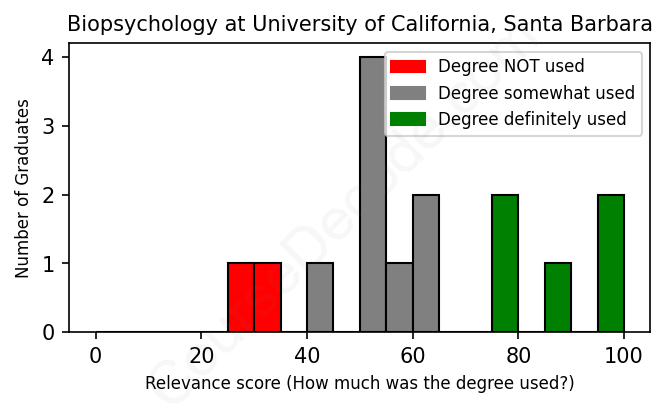
First, some facts. Of the Biopsychology graduates from University of California, Santa Barbara we've analyzed , here's how many have used (or NOT used) their degree in their career:

These are estimates based on AI analysis of 15 LinkedIn profiles (see below).
The verdict? Below average. Overall, with an average relevance score of 61%, Biopsychology graduates from University of California, Santa Barbara have a lower likelihood (-6%) of finding work in this field compared to the average graduate across all fields:
And for comparison, here's the chart for all profiles we've looked at across all degrees.
Also, after graduating, 66% of these graduates have pursued further education other than another Bachelor's degree (such as a Masters degree or other), compared to the average across all profiles of 35%. This suggests you may need more than just a Bachelors degree to be competitive as a Biopsychology graduate.
See the details:
|
Relevance score: 50% We think this person has gone into a career only somewhat relevant to their degree. We think this person has gone into a career only somewhat relevant to their degree.
DEGREE INFOGraduated in 2016 from University of California, Santa Barbara with a Bachelor of Science (B.S.) in Biopsychology. Also pursued further education since (see below). JOB HISTORY SINCE GRADUATIONParticipant in Food Systems Game Changers Lab Thought For Food Jun 2021 - Jul 2022 FURTHER DEGREES DONE SINCE GRADUATINGT. Colin Campbell Center for Nutrition StudiesCornell University 2023 - 2023 ABOUTNo information provided. |
The top 10 most common jobs done by the graduates we've analyzed (ranked most common to least) are:
When looking at the job history of graduates with a Biopsychology degree from the University of California, Santa Barbara, it seems like a lot of them end up in various healthcare roles, particularly as Medical Assistants, Registered Nurses, and in nursing-related positions. Many of these roles provide some indirect relevance to biopsychology since they involve patient interaction, care, and sometimes understanding of human behavior. However, in general, most jobs like administrative roles and scribe positions don't directly tap into the specific knowledge and skills acquired in a biopsychology program. Instead, these jobs are more focused on general medical assistance, documentation, or other operational tasks that don’t require a deep dive into biopsychological concepts.
On the flip side, there are instances where some graduates find more relevant roles, like becoming an Analytical Data Scientist or ABA Therapist, where their biopsychology background is clearly an asset. These roles require applying psychological concepts and data analysis skills in ways that align closely with their studies. Overall, while many of these graduates end up in healthcare and education-related fields where some aspects of biopsychology can be beneficial, the connection isn’t always strong, especially in early-career roles. It's a mixed bag—some are using their degree directly, while others are working in jobs where their education doesn't play a crucial role.
Here is a visual representation of the most common words in job titles for Biopsychology graduates (this is across all Biopsychology graduates we've analyzed, not just those who went to University of California, Santa Barbara):

It looks like graduates from the Biopsychology program at UC Santa Barbara tend to follow some interesting career paths after they finish school. For many, the first job out of college leans heavily toward the medical field. A significant number land positions as medical assistants or nursing assistants shortly after graduation, which makes sense given their background in biopsychology and neuroscience. This early experience often sets them up for more advanced roles, like registered nursing or even specialized positions within healthcare. Others find themselves in roles that connect with psychological services or data analysis, such as working in behavioral health clinics or as information analysts.
Five to ten years down the line, many graduates have advanced into more substantial roles within healthcare or education. We see a variety of positions such as registered nurses, high school substitute teachers, and even district nurses, showing a commitment to applying their biopsychological knowledge in meaningful ways. Some have carved out unique niches, like working as movement specialists or in specialized medical roles, including resident physicians. However, it's worth noting that not everyone sticks strictly to biopsychology-related jobs. A few have ventured into different areas, like coaching or administrative roles, which may not be directly linked to their degree. Overall, while some have had successful, relevant careers, others have branched out into less obvious fields, reflecting a mix of outcomes among these graduates.
Getting a Bachelor’s degree in Biopsychology at UC Santa Barbara can be a pretty challenging ride, but it really depends on your interest and background in both biology and psychology. The coursework dives deep into both fields, blending neuroscience, behavior, and psychological principles, which can be intense if you're not naturally inclined towards science. Classes can be demanding with a good mix of lectures, labs, and research projects, so it's not a walk in the park, especially since UCSB has a reputation for academic rigor. Overall, it’s tougher than some degrees, but if you’re passionate about understanding the mind and body connection, it can also be super rewarding! Just be ready to hit the books and stay organized to keep up!
Most commonly, in the LinkedIn profiles we've looked at, it takes people 4 years to finish a Bachelor degree in Biopsychology.
Looking at these UCSB Biopsychology grads, it seems like they've had a pretty mixed bag when it comes to making good money. Some of them, especially those who moved into nursing or data science, probably started raking in decent salaries after gaining some experience, which is pretty solid since health care and tech jobs tend to pay well. But others, like those working in education or support roles, might be earning a lot less, especially at the start. Overall, it looks like a few are definitely on the right track to making decent money, while others might still be hustling to find their financial footing.
Here is a visual representation of the most common words seen in the "about" section of LinkedIn profiles who have a Bachelor degree in Biopsychology (this is across all Biopsychology graduates we've analyzed, not just those who went to University of California, Santa Barbara). This may or may not be useful:

Here are all colleges offering a Bachelor degree in Biopsychology (ordered by the average relevance score of their Biopsychology graduates, best to worst) where we have analyzed at least 10 of their graduates:
| College | Score | Count |
|---|---|---|
 University of Michigan University of Michigan
|
73 | 10 |
 Tufts University Tufts University
|
67 | 11 |
 UC Santa Barbara UC Santa Barbara
|
64 | 10 |
 University of California, Santa Barbara University of California, Santa Barbara
|
61 | 15 |